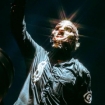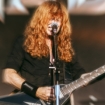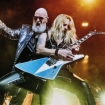Power ballads are a cornerstone of every hair-metal band's discography, an excuse for them to turn down the hypersexual bluster and ham-fist their way through a cheesy love song that reads like a high-school journal entry. For capital "M" Metal bands, the power ballad isn't a requirement so much as it is a flex of one's abilities to accomplish the exact opposite of what they're known for.
It's not easy for bands who specialize in frothing rage and technical virtuosity to cool their jets and write a slower, softer tune that's both emotionally convincing and musically well-crafted. Most bands can't swing it, which is why metal fans are prone to groans and eye-rolls when their favorite heshers break out the whole, "This is a slow one," spiel at live shows.
However, sometimes, if it's done right, a metal power ballad can be utterly exceptional — dynamic, profound and exhilarating. Below are 16 of the greatest non-hair-metal power ballads in the genre's history, from heartbroken confessions and tormented admissions to thought-provoking existential reckonings. Lighters up.
Alice in Chains - "Love, Hate, Love"
Leave it to Alice in Chains to flip the lovesick power ballad into a dopesick standout, twisted, sinister and gut-wrenching. Delivered with characteristically ragged, gripping emotion by the late, great Layne Staley, the lyrics speak as much to the agony and ecstasy of drug addiction as to the double-edged sword of romantic entanglement: "Lost inside my sick head/I live for you but I'm not alive."
Avenged Sevenfold - "I Won't See You Tonight Pt. 1"
"I Won't See You Tonight Pt. 1" is the kind of song you'd want playing when you're down on your knees, screaming upwards into the rainy night sky while cradling a loved one who just died in your arms. Avenged Sevenfold are no strangers to the ballad, but this nine-minute epic from their metalcore breakthrough, Waking the Fallen, is the most powerful one in their repertoire.
Body Count - "The Winner Loses"
Even the band who wrote "Cop Killer" have a softer side. "The Winner Loses" is a tragic song about a person who succumbed to a cocaine addiction, written from the perspective of a friend who saw danger coming but wasn't able to steer them away from their vices. It's a powerful cautionary tale and a magnificent musical feat, adding soulful back-up singers to thrash ballad staples that give it uniquely tuneful R&B flavor.
Danzig - "How the Gods Kill"
Danzig's third album is considered by many — including bassist Eerie Von — to be ol' Evil Elvis' magnum opus, taking the bluesy heavy metal of his solo project into doomier, gothier domain. A masterclass in smoky, slow-burning, ultimately explosive dynamics, its title cut is a power ballad about "a search for knowledge and an understanding of oneself," as Glenn told R.I.P. magazine in 1992. Know this: It slays.
Deftones - "Be Quiet and Drive (Far Away)"
Probably no one who heard Deftones' debut album, Adrenaline, came away thinking: These guys have a great power ballad in them. But then the Sactown nu-metal pioneers dropped their follow-up, Around the Fur, and specifically, its stunning second single. Yearning, shoegazing and irresistibly massive, the song captures a fearless band driving their sound to its farthest reaches — and being anything but quiet about it.
Ghost - "He Is"
Meliora's soaring, soothing anti-hymn is exactly what you'd expect occult-rock necromancers Ghost to deliver as a power ballad: a love song to the devil. "He is/He's the shining in the light without whom I cannot see/He is/Insurrection, he is spite, he's the force that made me be," Papa Emeritus III sings with rapturous devotion as the swelling instrumentation builds from the gently plucked acoustic intro. Hail Satan, indeed.
Iron Maiden - "Children of the Damned"
Bruce Dickinson's skyscraping belt is readymade for the power ballad, and he delivered an exemplar of the form with "Children of the Damned," The Number of the Beast's epic second track. Vocally inspired by Ronnie James Dio's performance on Black Sabbath's "Children of the Sea," and thematically based on a 1964 horror movie about psychic kids, the song dials back on Maiden's signature gallop for wide-screen majesty.
Judas Priest - "Dreamer Deceiver"
If an uninitiated skeptic ever tries to criticize Rob Halford's vocals for their high-flying demeanor on Judas Priest's faster songs, play them "Dreamer Deceiver" and they'll shut right up. The Metal God's voice occupies a bassier low range for the first half of this dulcet stunner from 1976's Sad Wings of Destiny — and then suddenly ascends multiple octaves in a matter of seconds, hitting piercing peaks before a savory solo takes it home.
Killswitch Engage - "The End of Heartache"
Before Killswitch Engage, the words "metalcore" and "power ballad" went together like oil and water. The Massachusetts band's first two albums revamped their genre by pairing stadium-sized clean choruses with chugga-chugga 'core fare, but their 2004 LP was their first with now-former singer Howard Jones, whose sonorous croon soared atop double-kick-driven mosh riffs on its grief-stricken title-track. At once tender and resounding, "The End of Heartache" packs in the feels.
Megadeth - "A Tout le Monde"
Most Megadeth songs are characterized by Dave Mustaine's six-string virtuosity and his sneering vocal lashings, which is part of the reason why "A Tout le Monde" sounds so impactful. The sentimental standout from 1994's Youthanasia was anthemic and tearful the first time around, and even more so once the thrash OGs transformed it into a French-English duet with Lacuna Coil's Cristina Scabbia on the 2007 redux.
Metallica - "Fade to Black"
So much of Metallica's early appeal stemmed from their slash-and-burn rejection of the mushy glam metal that was dominating heavy music in the early Eighties, so when they decided to dip their toes into balladry on Ride the Lightning, they made sure to do it right. "Fade to Black" is a heartbreaking exposé on suicidal ideation that packs an emotional punch while also keeping everything Metallica does best intact — glass-shattering guitar crunch, a scorching solo and James Hetfield's snarling vocal accents at the end of every line.
Pantera - "Cemetery Gates"
There are three standout power ballads in the Pantera playbook, and we'd hear the argument in favor of "Hollow" or "This Love" and then say this: "Cemetery Gates" is better (by an inch). In particular, Philip Anselmo's superhuman vocals sound almost heaven-sent on this Cowboys From Hell centerpiece, giving the song a special pristine poignancy. And then there's that riff. Even on their slow songs, the Texan juggernaut can't help themselves from busting into brief thrash trots, mosh-worthy grooves and a couple string-bending Dime solos.
Slipknot - "Snuff"
All Hope is Gone contains some of Slipknot's most underratedly heavy songs, but it also has "Snuff," a passionate slow-burner that sees Corey Taylor working through the complex emotions of a breakup that left him feeling mistreated. The frontman typically uses 'Knot songs to personify blunt-force rage, which makes the measured restraint of "Snuff"'s gradual build feel all the more impactful.
Suicidal Tendencies - "How Will I Laugh Tomorrow"
All Mike Muir wanted was a Pepsi and he got institutionalized. But on this hard-hitting power ballad, Cyco Miko wrestles with darker inner feelings, namely, a debilitating depression that has him "silently screaming as I bang my head." Featuring raw, beautiful vocals from Muir, and great guitar work from Rocky George and Mike Clark, this is a power ballad that's so heart-on-sleeve it needed a "Heavy Emotion Version," released on 1989's Controlled by Hatred / Feel Like Shit... Déjà Vu.
System of a Down - "Aerials"
Many metal bands use the power ballad form to open up about sensitive personal topics like love, heartbreak or depression, but System of a Down do the reverse on "Aerials," trading their granular political critiques and absurdist humor for existential musings about universal human flaws. Serj Tankian's sage wisdom ("Life is a waterfall/We drink from the river then we turn around and put up our walls") is accompanied by trance-like guitar licks and woozy bass plucks. It's weirdly beautiful.
Testament - "Return to Serenity"
The early Nineties were a make-or-break moment for most thrash bands, as new styles overtook the metal zeitgeist and forced last decade's heshers to prove their relevance in a more melodic mainstream environment. Testament rose to the challenge on "Return to Serenity," a captivating meditation on stinging loneliness that features Chuck Billy dropping profound poeticism like, "Rhyme without reason/Is why children cry/They see through the system/That's breeding them just so they die."








